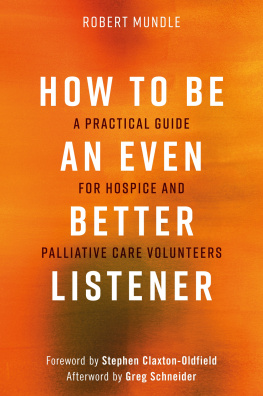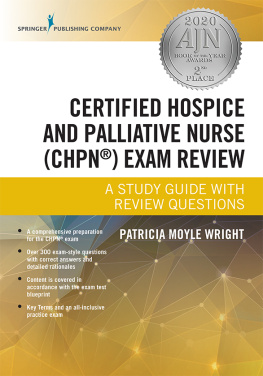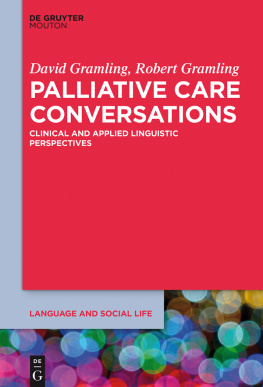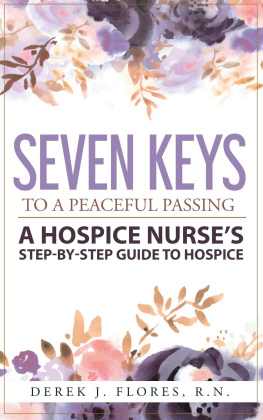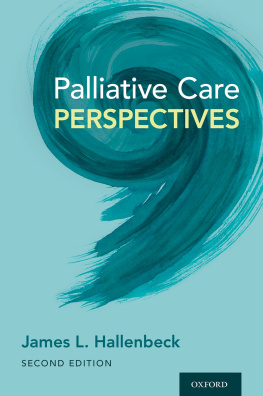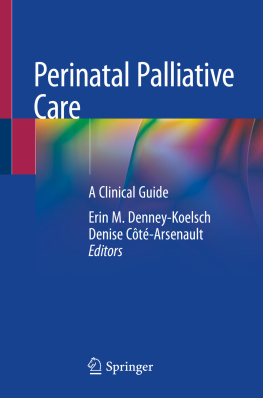
HOW TO BE
AN EVEN
BETTER
LISTENER
A PRACTICAL GUIDE FOR HOSPICE AND
PALLIATIVE CARE VOLUNTEERS
ROBERT MUNDLE
Foreword by Stephen Claxton-Oldfield
Afterword by Greg Schneider

Jessica Kingsley Publishers
London and Philadelphia
CONTENTS
FOREWORD
In my role as a university professor, I have been studying and publishing about hospice palliative care volunteers for 13 years. Like others before me, I realized very quickly that volunteers are the heart and soul of the hospice palliative care team. Hospice palliative care volunteers are compassionate and caring people who give freely of their time, energy, talents, and love to support dying persons and their important ones through what is often a terribly difficult time.
In my research, I have spoken with hospice palliative care volunteers as well as coordinators or managers of hospice palliative care volunteer programs. One of the questions I asked was What makes a good volunteer? The number-one answer I got from both volunteers and coordinators was to be a good listener. Here is one anonymous response I was given to the above question that nicely captures the essence of being a hospice palliative care volunteer: The drive or need to make a difference, a gentle heart, a listening ear, basic kindness, a healthy attitude of death and dying, and an understanding of what the patient and family are facing. It goes without saying that a volunteer is going to be more supportive if he or she is able to offer a listening ear and can also be comfortable with silencein other words, can just be with a patient.
It is absolutely essential that volunteers who are going to be working directly with dying persons and their families receive training to prepare them for their role. One of the training topics volunteers receive is a module on methods of communication and communications skills, with a focus on developing or refreshing active listening, and reflecting on ones communication style. New volunteers want to help, but they often say things like I wouldnt know what to say to a patient or What do we talk about? How to Be an Even Better Listener gives the reader great tips on, for example, initiating a conversation with a new patient. Take a look around the patients room, and youll likely find lots of things to talk about, such as personal objects. You can use them to start a conversation and engage patients in their stories. By doing so, you create an opening to be able to listen. Knowing how to listen includes listening with your ears and your body. This book describes how our body language (e.g. amount and level of eye contact) lets patients know that we are interested in hearing what they have to say, and also talks about the importance of hearing the feelings behind what a person is saying.
The results of volunteer training surveys show that of all the modules covered in a typical volunteer training program, communication skills are regarded as the most important. It is also the topic that volunteers say they want to know more about. This book provides the more about this important topic. Good communication requires more than just talking. It requires good listening as well and throughout the book, Robert offers valuable advice, tips, and strategies in the art of becoming an even better listener.
How to Be an Even Better Listener is an accessible and enjoyable read filled with wonderful stories told by both dying persons and volunteers. In addition to giving valuable tips on how to listen well, this book also discusses some of the benefits of listening for both patients and volunteers, some of the risks and challenges of listening to others stories, how telling our own stories benefits us, and how feeling heard and understood not only makes us feel less alone but also makes us better listeners ourselves.
Hospice palliative care volunteers occupy a unique role, often spending more time at the bedside of dying persons than other members of the professional caregiving team. Volunteers consider communication to be the most important topic in their training and have a desire to learn more about it. I agree that it is all about the communication and, in my opinion, How to Be an Even Better Listener should be essential reading for all hospice palliative care volunteers as well as healthcare professionals.
Stephen Claxton-Oldfield, PhD, CT
Associate Professor, Mount Allison University
PREFACE
In the United Kingdom, there are approximately 125,000 volunteers working in more than 200 hospices (HospiceUK 2017). In France, there are 350 associations of palliative care volunteers with an estimated 6000 members (Tibi-Lvy and Bungener 2017). And in the United States, there are about 500,000 trained volunteers supporting the work of almost 6000 hospices and the patients and families they serve. Of these volunteers, 60 percent assist with direct patient care; 20 percent provide support for clinical care; and 20 percent provide general program support (eHospiceUSA 2016).
What exactly do hospice palliative care volunteers do? According to the French National Palliative Care Association, the tool par excellence of volunteers is listening (Tibi-Lvy and Bungener 2017, p.78). And according to one palliative care service in a teaching hospital in Canada, volunteers listen first and foremost; listening is central to their role providing assistance, companionship, and practical support to terminally ill patients and their loved ones (OBrien and Wallace 2009, p.200). Volunteers have the time to listen. As OBrien and Wallace put it, Mostly they bring the gift of timevolunteers take the time to make a difference in someones day (p.201).
Some listeners are better than others. Really good listeners are life-giving listeners for those who are ill or suffering in any way, whether it may be physically, emotionally, socially, or spiritually. And they are crucial for those who are struggling to come to grips with the end of life in hospice palliative care.
According to a recent study about the importance of communication skills in end-of-life care (Brighton et al . 2017), a majority of participants drawn from hospice palliative care volunteers expressed the need for more training with regard to listening. Participants said that they appreciated especially the training they had received from chaplains, who offered an approach to listening care that helped patients feel valued and heard. These findings echo those of a previous study (Worthington 2008) in which volunteers learned about the qualities of nonverbal communication from a chaplain.
Both of these studies caught my interest because I am a palliative care chaplain and listening is central to my role. Like many chaplains, I see myself as kind of a professional listener (Mowat et al . 2013). I am also a clinical educator on topics of spirituality, and grief and bereavement. Over the years, I have had the pleasure of speaking to many groups of hospice palliative care volunteers as part of various training and continuing education programs.
Listening is something we can all learn to do better. As psychotherapist Julia Samuel says, The ability to listen well is by no means the sole preserve of professional therapists (2018, p.xiv). If you are a hospice palliative care volunteer, or if you are a healthcare provider who might be wondering why and how to listen better to your patients and their loved ones, then I invite you to continue reading. I help healthcare professionals and volunteers improve their communication skills, and I am ready to share with you what I believe can help you in the art of becoming a better listener.
Next page
